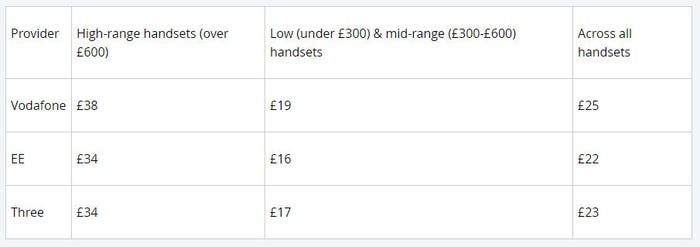The UK Citizen’s Advice service has advised that UK citizens are getting rinsed by their operators when they come to the end of subsidised phone contracts.
October 20, 2017

The UK Citizen’s Advice service has advised that UK citizens are getting rinsed by their operators when they come to the end of subsidised phone contracts.
One of the major reasons we sign up to two-year contracts is that we want a shiny new smartphone but haven’t got the cash to pay for one up-front. For decades operators have looked to entice customers by effectively offering to finance the purchase of said smartphone in return for a post-paid contract commitment. The total cost of ownership is invariably greater than buying the handset yourself and then going SIM-only, but that’s a price many are willing to pay.
But according to Citizen’s Advice, unless they specifically ask for a new contract, customers of Vodafone, EE and Three continue to be charged at the same rate even after their lock-in period has expired. In other words, even after they’ve paid the phone off they continue to be charged as if they hadn’t.
“Some of the largest mobile phone providers are routinely overcharging their loyal customers,” said Gillian Guy, Chief Exec of Citizens Advice. “Mobile phones are now an essential part of modern life, but the way that the cost of handsets are hidden within some mobile phone contracts gives phone providers a way to exploit their customers.
“It is clearly unfair that some phone providers are charging loyal customers for handsets that they have already paid for. It’s especially concerning that older customers are more likely to be stung by this sharp practice.
“Phone providers must now make sure that any customers staying in a contract past the end of a fixed deal have their monthly bill reduced to reflect the cost of the handset. Providers could make it much easier for consumers to compare prices by separating out the cost of handsets from the cost of services like data and minutes for all contracts, that way it would be much clearer what they’re paying for.”
To be fair to operators our experience is that they usually get in touch towards the end of a contract to dangle further smartphone carrots in a bit to get you to sell your soul for another couple of years. But if they don’t then Citizen’s Advice is right to say there should be an automatic reduction in the bill. That process is presumably so straightforward that it’s hard to give those operators that don’t do it the benefit of the doubt.
Here’s a summary of the findings. Citizen’s Advice offered no explanation of why O2 and the MNVOs weren’t apparently scrutinised. Perhaps they got bored and figured they’d made their point anyway.

About the Author(s)
You May Also Like








.png?width=300&auto=webp&quality=80&disable=upscale)


_1.jpg?width=300&auto=webp&quality=80&disable=upscale)


.png?width=800&auto=webp&quality=80&disable=upscale)